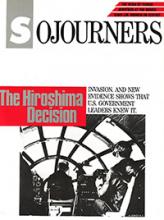The first thing I remember hearing about the atomic bomb was that it had saved the life of my father and of my family. In 1945 my father was a young naval officer aboard a destroyer-minesweeper in the Pacific Ocean. Just married and just graduated from college, he was shipped off to war and became part of the island-hopping U.S. forces that were moving steadily toward Japan.
He and his ship were scheduled for the invasion force that would be needed to take the Japanese islands. It was believed that 500,000 to a million U.S. lives could be lost in the invasion. Destroyer-minesweepers, because of their exceptionally dangerous job, had an unusually high mortality rate.
Then came August 6 and reports of a new kind of bomb dropped on the city of Hiroshima. The newscasts said it was many times more powerful than any bomb before. One explosion wiped out an entire city. Three days later the United States dropped another atomic bomb on the city of Nagasaki. The Japanese quickly surrendered.
Most people knew little about the bomb at that moment, much less about the implications of what had just happened. All everyone knew was that the war was over. The bomb had ended it, and the whole country was jubilant.
There would be no invasion now. My father would come home to his new bride and together they would raise five children. The bomb had saved my family.
Before he came home, though, my father's ship went to Hiroshima as part of the occupation force. He was, therefore, one of the first to see the devastation of the bomb. The destruction seemed unbelievable to him and made a lasting impression. One day while he was on patrol through what was left of Hiroshima, a little girl came out of the rubble and approached the U.S. soldiers. She was alone, wearing only rags, and she had no arms. When my father finally told me about the incident 39 years later, he cried. But, the bomb had ended the war.
Read the Full Article

